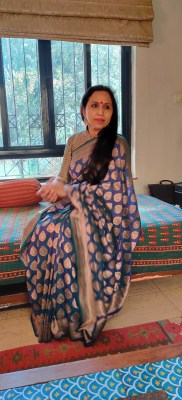By Sukant Deepak
New Delhi, Feb 21 : Lamenting that fun seems to be fast disappearing from our dictionaries, especially when it comes to imparting education, she feels that instead of cramming young minds, it is important to adopt creative ways and bring in interesting technology in order to make learning attractive, especially when it comes to the arts.
Both sport and any kind of art form should be made mandatory at the school level, but the ‘method’ has to be a little more laid back and enjoyable for the receiver. If we have already decided that music is always intense and dreary, obviously people will not come closer to rhythm. Tradition doesn’t have to be boring, it can be rewarding,” singer and scholar Vidya Shah tells IANS.
For someone who started her journey with training in Carnatic music but moved to Hindustani classical owing to her fascination towards Khayal gayaki, doing multiple things — singing, writing, editing and contributing to encyclopedia come together in one whole. “Instead of distracting me from singing, doing all this makes me focus more towards my music. Every time I read up something on music while researching, it adds to my knowledge which I share with my audiences. Sometimes, if you have something to share more than just singing, an interesting relationship develops with the listeners.”
The recent lockdown, which she found mentally exhausting as there were no performances and travelling, something that has been an integral part of her life for years now, did provide her the space to introspect and reach out to her community and also folk artists and accompanying musicians who had been suffering owing to lack of work. “That is how the trust ‘Bhooma’ was conceived, which will not just look at performing artists, but also crafts and visual artists.”
The trust plans to familiarise artists with technology in case they want to do a digital or use the space for an online presentation or video. Besides, there is also an archiving and documentation project where accompanists will create short videos acquainting the audiences with different instruments, how they are made and contributing to a performance. They are paid a fee for this.
“Although at a nascent stage, I am also in talks with some doctor friends for providing health care facilities to artists. We are still drawing a framework,” says the artist who was in conversation with Prasoon Joshi during the ongoing Jaipur Literature Festival.
Lamenting the cut for culture in the recent budget, the artist says, “It is quite unfortunate that on hand we take such pride in Indian culture and put it on such a high pedestal, but fail to find ways to preserve it. It has to be done on multiple levels, individuals cannot do everything all alone.”
Shah, who has engaged with Manganiars of Rajasthan, Women on Record performances and worked with new age composers from across continents says that it is paramount for her to push boundaries consistently.
“I feel, in music, there are some givens you cannot play around with — taleem, riyaaz, and the framework in which you practice your art. When we talk about pushing boundaries, first we have to work within the boundary to make the foundation solid.
“I work across genres. Even when I collaborate with a producer who does Jazz, we both work within our circumferences, but try finding a common ground which is beautiful in terms of making a new creation.”
Currently editing an anthology looking at entertainment in early 20th century India and looking forward to performing at the upcoming Holi celebrations at India Habitat Centre in the capital, Shah is missing the magic of live. “The kind of music that we do was made for a live audience. When we are looking at a new normal, it is also important to look at a new normal way of bringing things live. We don’t realise how art and culture is such an integral part of giving us a sense of sanity. There is only so much OTT one can do, no?”
–IANS
sukant/dpb

